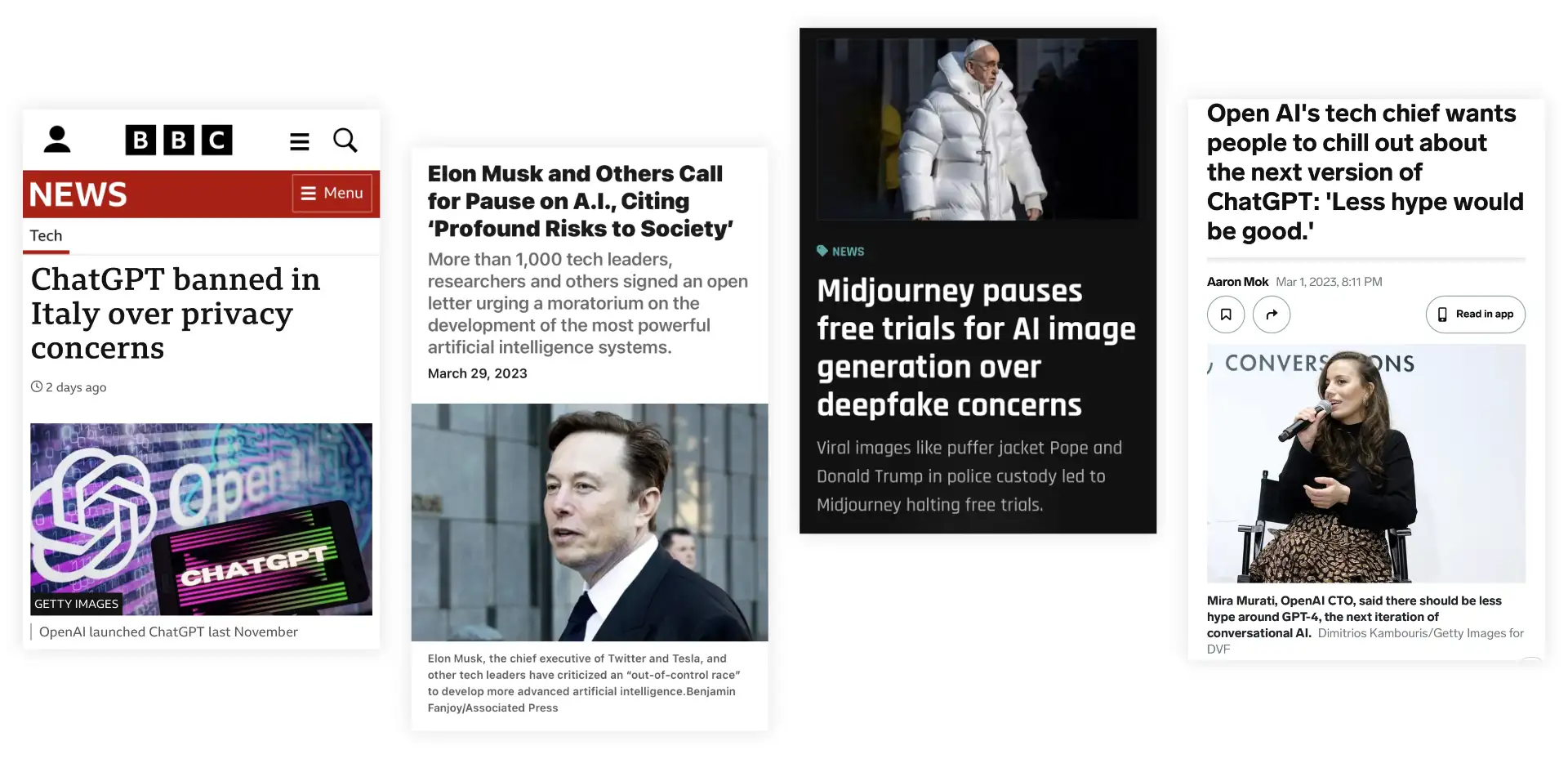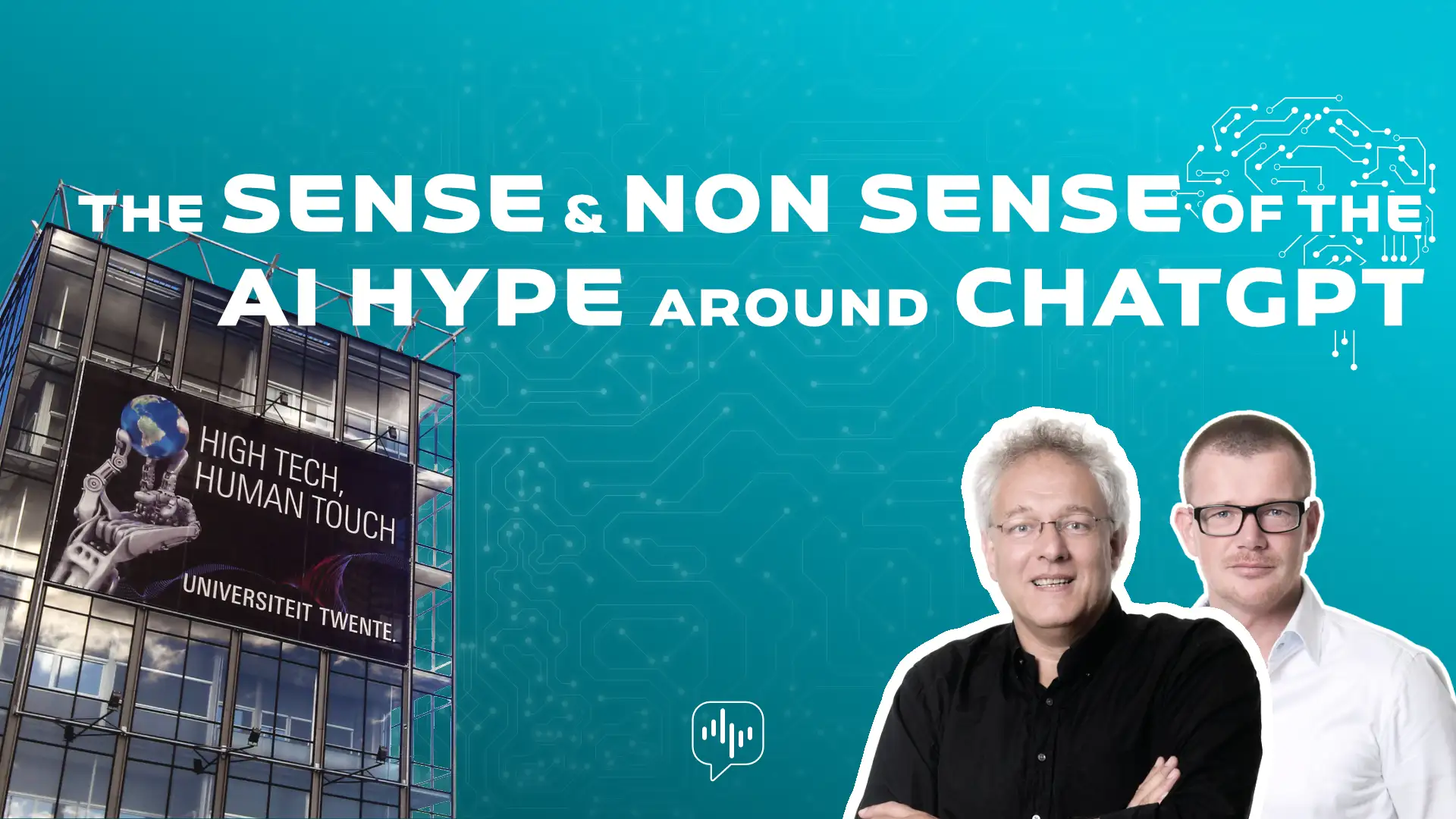In this article we will explore the impact of ChatGPT on customer service as well as the challenges and opportunities artificial intelligence presents.

But first things first: experts in the field of AI called for a pause in the development of AI software to develop and implement security protocols first. This invoked responses like:
 Is the call to halt current developments realistic? Perhaps only if the government intervenes. And is that wise? Or should we as a Western society take the lead if we want to make regulation globally negotiable?
Is the call to halt current developments realistic? Perhaps only if the government intervenes. And is that wise? Or should we as a Western society take the lead if we want to make regulation globally negotiable?
 The development of AI is a complex and unpredictable process. Is there a real possibility that systems with artificial intelligence will exhibit unexpected and potentially dangerous behaviors? And how realistic is this fear of AI?
The development of AI is a complex and unpredictable process. Is there a real possibility that systems with artificial intelligence will exhibit unexpected and potentially dangerous behaviors? And how realistic is this fear of AI?
 Clearly, the transparency of AI algorithms must be improved. There will need to be clear agreements and standards for the development and use of AI. With independent oversight and consideration of AI ethics.
Clearly, the transparency of AI algorithms must be improved. There will need to be clear agreements and standards for the development and use of AI. With independent oversight and consideration of AI ethics.
 The Italian privacy regulator claims that ChatGPT violates European privacy legislation (GDPR) on a number of key points. And after Italy, Germany and France are the next countries in doubt about privacy regarding the new AI tool. Will more European countries follow?
The Italian privacy regulator claims that ChatGPT violates European privacy legislation (GDPR) on a number of key points. And after Italy, Germany and France are the next countries in doubt about privacy regarding the new AI tool. Will more European countries follow?
 But when we refer to ChatGPT, are we talking about an AI system with (semi)human intelligence or are we talking about large language models? Every time a new version or variant of ChatGPT is released, the experts in the media talk about the impact on our society and the burgeoning “digital consciousness.”
But when we refer to ChatGPT, are we talking about an AI system with (semi)human intelligence or are we talking about large language models? Every time a new version or variant of ChatGPT is released, the experts in the media talk about the impact on our society and the burgeoning “digital consciousness.”
Sense or Nonsense? In any case, these are some interesting and often justified reflections. Even with the introduction of the iPhone, for example, you saw such discussions. The reality that later sunk in eventually gave a good overview of what can and cannot be done, what could go away and what remained to be desired.
The same is likely to happen with ChatGPT. Some people will fantasize about what can be done, others will remain skeptical and say it makes no sense at all. The truth does not really exist here and of course perception is hugely dependent on each person. But ChatGPT with artificial intelligence will certainly have a big impact on “our way” of working. How? We will see.
Anyway: All the attention contributes to the debate about the risks and opportunities of AI technology. For us, these kinds of public discussions are very useful and necessary to get a better understanding of AI in society and customer service.
The question on our mind right now is: what is the significance of ChatGPT for customer contact?
It is not that easy to answer that question now. We don’t know exactly what else will be coming our way in the next few years, which technologies will ultimately prove successful with which target groups, and what laws and regulations will come along. But we do know that a good understanding of customer demand is the starting point for an effective service delivery, whether delivered by people, automated systems or a combination of the two. The question we will try to answer here is: what is the significance of modern applications like ChatGPT for customer contact?
What is ChatGPT?
While most of you will by now have an idea of what ChatGPT is capable of, it won’t hurt to give a brief description here. ChatGPT is an advanced multi-modal and lingual AI-driven language model developed by the American company OpenAI. It came out with the first release in December 2022 and now, 3 months later, already launched the next: GPT-4. The application can have “human-like” conversations with its users, often hardly distinguishable from real “human-to-human” conversations. GPT-4 is even multimodal and can, for example, describe a physical environment to blind and visually impaired people, analyze Web pages, and read or summarize the most important parts. Other companies like D-DI are already building a spoken interface around it using speech recognition and synthesis to operate ChatGPT entirely by speech.
Thanks to the huge amount of data with which GPT-4 is trained, ChatGPT can “understand” a wide range of topics and provide reasonably meaningful information about them. This makes it ideally suited for relatively simple customer contact applications, where it is necessary to respond quickly and efficiently to customer inquiries. However, to do this really well, the application must also have knowledge of its specific users and thus not answer with too many generalities. The question now is: how will you do that?
The potential impact on customer service
Despite these imperfections, ChatGPT and similar AI applications have the potential to dramatically change at least parts of our customer service. For example, it is already being applied to:
- Interpreting questions and generating answers with accurate general and company-specific information from a company’s linked knowledge base or website in real-time conversations.
- Generating and formulating texts such as an apology letter, marketing message or writing instructions for installing a service or product. Or writing texts about the advantages and disadvantages of different products based on many customer reviews.
- Recognize basic emotions in text and respond empathically to (un)satisfied customers.
- Translating and summarizing text and making it easier and accessible for people who have difficulties with language or reading comprehension of long complex texts.
The AI software provides more consistent answering, faster response times, is available 24/7, and is scalable. By automating customer contact, companies can use customer contact employees more efficiently and train them in a much more targeted way for better quality.
Challenges and considerations
While programs like ChatGPT offer numerous benefits, as mentioned, there are also some challenges and considerations to keep in mind before embarking on them:
- Chat GPT does not really understand the content of the text itself. In fact, the text is created based on probability. While ChatGPT seems impressive in “understanding” and answering a wide range of questions, there are still situations where it may struggle and even provide incorrect (fake) information. You still need to bring in human assistants where necessary. The Paradox: A user can only evaluate what GPT writes if they themselves are experts on the subject.
- As a company, you must establish ethical guidelines for the use of AI in customer contact (and stick to them) and ensure that ChatGPT is deployed in a responsible and transparent manner.
- ChatGPT for personal customer contact depends on context, reliability and requires the processing of personal data. However, as a business, you must ensure that your customers’ privacy is protected and that adequate security measures are in place to protect this sensitive information.
- Although ChatGPT can conduct human-like conversations, it still lacks the “true” empathy of a human employee. Having a balance between automation and human contact to ensure that your customers feel valued and understood is key
- Advisors, when using automated text generation, miss out on the learning process and will have a harder time understanding certain material. Educate them to prevent them from just adopting any automatic text generation.
- Ensuring real human contact in customer service remains hugely important. The more CX digitizes the more there will be a need for human contact. The challenge for human customer service: giving customer contact employees the time, (tech) resources, responsibility and authority to truly manage the relationship with the customer.
Future prospects
The future of customer contact undoubtedly lies in the continued development and integration of AI technologies such as ChatGPT. As AI systems rapidly become more sophisticated, we can expect them to get better and better at understanding and answering more complex customer questions. Here are some future developments we can expect:
- Improved emotional intelligence: Future generations of ChatGPT will get better at recognizing and likely responding appropriately to human emotions, enabling a more empathetic and personalized approach to customer service.
- Seamless collaboration between AI and human workers: In the future, we can expect seamless collaboration between AI systems and human employees, with both parties complementing each other to provide an optimal customer experience.
- Proactive customer service: Using advanced analytics and predictive algorithms, AI systems can proactively identify and solve problems even before customers are aware of them.
- Personalized service: By combining customer data and AI analytics, ChatGPT can provide more personalized and relevant service that matches each customer’s unique needs and preferences.
- Integration with other technologies: ChatGPT can be integrated with other emerging technologies, such as virtual reality (VR) and augmented reality (AR), to create new and immersive experiences that can take customer service to the next level. (Read our article on the MetaVerse)
Preliminary conclusion
The significance of programs like ChatGPT for customer contact is enormous and presents both challenges, problems and opportunities for businesses and governments. By properly implementing AI-driven systems, companies can benefit from faster response times, 24/7 availability, scalability, and cost savings. At the same time, they must (continue to) pay attention to ethical considerations, privacy and data security, as well as maintaining a personal touch in customer interactions.
The future of customer service will undoubtedly include greater contributions from AI systems, with ChatGPT and similar technologies having the potential to revolutionize the way companies communicate with and respond to the needs of their customers. By embracing the power of AI while keeping an eye on human connection and empathy, companies can provide customer service that is both efficient and personalized.
In the coming years, we are likely to witness the continued evolution of AI-technologies that will continue to transform the customer contact landscape. Companies and organizations that embrace these changes and adapt to the new realities will likely end up better positioned to meet the ever-changing expectations of their customers and succeed in the competitive marketplace.
Meanwhile, it is critical that companies, policy makers, AI developers and researchers work together to ensure that the implementation of AI in customer contact is done ethically, responsibly, and transparently. If done properly and transparently, it will help build trust with customers and ensure that the benefits of AI technologies are realized in a fair and sustainable way.
In summary: ChatGPT is a groundbreaking technology that has the potential to radically change the way companies handle customer contact. While there are challenges enough, the AI technology also offers unprecedented opportunities to improve and personalize customer service. By working together and finding the right balance between automation and human contact, businesses and organizations can take advantage of this innovation and set a new standard for excellent customer service.
